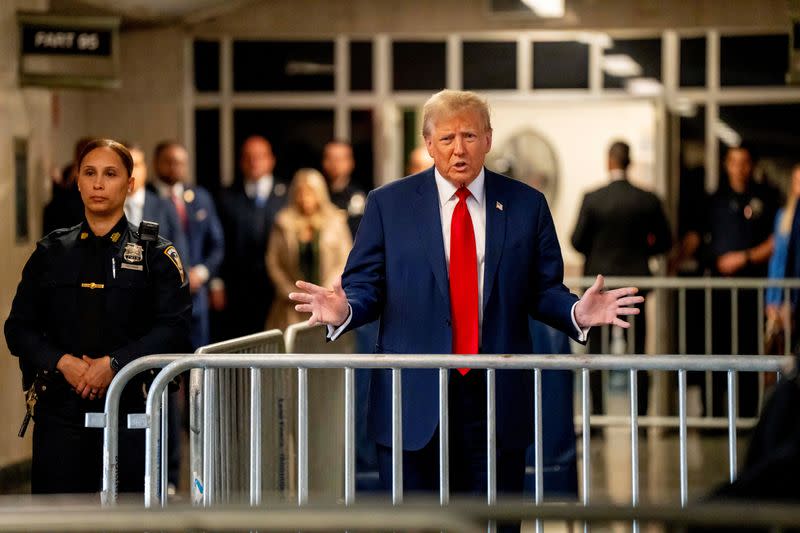Trump allies drafting plans to erode Fed's independence, WSJ reports

(Reuters) -The allies of Republican presidential candidate Donald Trump are drafting proposals that would attempt to erode the Federal Reserve's independence if he wins, the Wall Street Journal reported on Thursday, citing people familiar with the matter.
A small group of the former president's allies has produced a nearly 10-page document outlining a policy vision for the central bank, according to the report.
The group argues that Trump should be consulted on rate decisions and would have the authority to remove Jerome Powell as Fed Chair before his term ends in 2026, the report added.
Trump had picked Powell in 2017 to lead the U.S. central bank but turned against him soon after. He said in February that he would not reappoint Powell and believed the Fed chief would lower interest rates to help President Joe Biden's prospects for re-election.
The Journal said it could not determine if the former president was aware of or signed off on the effort, but some people close to the discussions believe the work has received his blessing.
The former president has had informal discussions with advisers about possible candidates to lead the Fed and has asked associates whether they would be interested in the job, the report said.
The Trump campaign played down the report on Friday, sharing an earlier statement with Reuters in response.
"Let us be very specific here: unless a message is coming directly from President Trump or an authorized member of his campaign team, no aspect of future presidential staffing or policy announcements should be deemed official," the statement from campaign co-chairs Chris LaCivita and Susie Wiles said.
However remote the likelihood of such a plan becoming reality in its entirety or in part, the prospect of Trump having extensive sway over Fed policy decisions that wield tremendous influence over the direction of the world's largest economy and global asset markets was already resonating.
Among the pegs supporting the U.S. dollar's stature as the world's reserve currency, for instance, is the Fed's ability to set monetary policy on its own without political oversight. That status in turn is key to granting the U.S. government a nearly unchecked ability to borrow on global bond markets at relatively low interest rates despite having a $26 trillion debt load, dubbed the "exorbitant privilege."
"If Fed independence is eroded it would be absolutely disastrous," said Citigroup Global Chief Economist Nathan Sheets, who served as under secretary for international affairs for the U.S. Treasury under Trump's predecessor, Democrat Barack Obama.
“When I think about the risk for markets and the dollar, any policy change that eroded Fed independence in an appreciable way would be greeted by the market very vigorously and adversely and be a source of great pressure and volatility," he said. "Any gains a political actor might think they glean would be so small compared to the potential cost that they might have ... it leaves me optimistic it is not a game worth playing."
(Reporting by Niket Nishant in Bengaluru; Additional reporting by Howard Schneider in Washington; Editing by Anil D'Silva, Chizu Nomiyama and Andrea Ricci)


